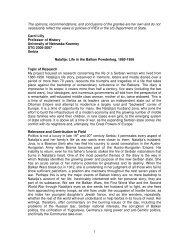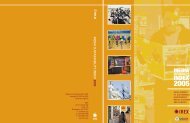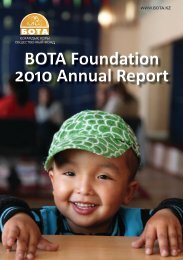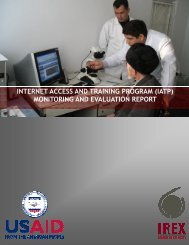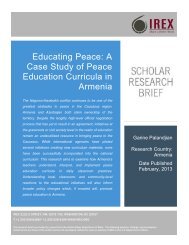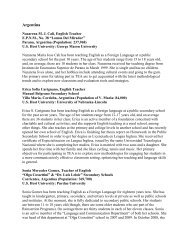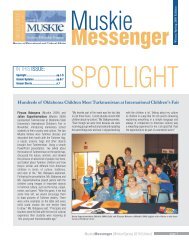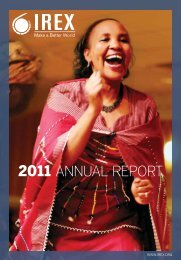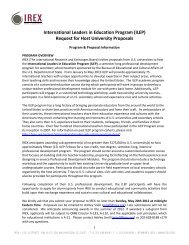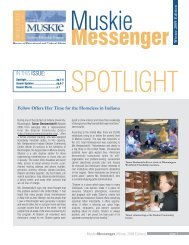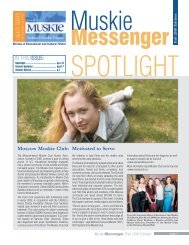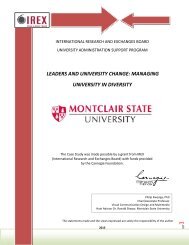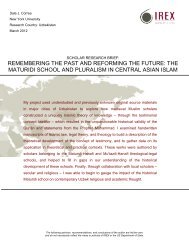Muskie Messenger Summer 2011 - IREX
Muskie Messenger Summer 2011 - IREX
Muskie Messenger Summer 2011 - IREX
Create successful ePaper yourself
Turn your PDF publications into a flip-book with our unique Google optimized e-Paper software.
SPOTLIGHT<br />
Strengthening Foster Care<br />
for Georgian Children<br />
<strong>Muskie</strong> alumni in Georgia recently established the first<br />
Georgian Foster Care Organization (GFCO) within the framework<br />
of an advocacy project funded by the European Union<br />
Delegation in Georgia.<br />
“GFCO, which currently boasts nearly 100 members nationwide,<br />
unites foster parents from all over Georgia who help<br />
ensure that vulnerable children who lack parental care<br />
have the opportunity to grow up in a safe, caring family<br />
environment,” says Maya Mateshvili<br />
(<strong>Muskie</strong> 2006).<br />
“The main goal of establishing the GFCO was to protect<br />
the interests and rights of the foster parents and the children<br />
in their care, as foster care is a relatively new concept for<br />
Georgia and lacks adequate support from the state.”<br />
Mateshvili recently joined the Georgian branch of the UKbased<br />
international NGO EveryChild, headed by Andro<br />
Dadiani<br />
(<strong>Muskie</strong> 2002). Making a transition from managing<br />
public relations at the UN World Health Organization to being<br />
in charge of a children's rights advocacy project for an NGO<br />
has been a rewarding yet challenging career move. “Being a<br />
mom myself, I naturally care about child welfare,” Mateshvili<br />
says. “So when at one of the <strong>Muskie</strong> Alumni Association of<br />
Georgia (MAAG) board meetings Andro told me about<br />
EveryChild's efforts to give children living in institutions the<br />
opportunity of being placed in a family-like environment by<br />
strengthening alternative child care services, I knew I wanted<br />
to make my contribution to this good cause.”<br />
Mateshvili and Dadiani conducted several meetings with over 100<br />
non-kinship foster caregivers in the capital city of Tbilisi as well as<br />
in the regions to convey the goals, structure and membership terms<br />
of the GFCO to its prospective members.<br />
Recognizing the trauma and damage caused to children who<br />
reside in institutional care, the Government of Georgia has<br />
made a commitment to close down all remaining large scale<br />
residential care institutions (orphanages) in the country over<br />
the next two years. Although it is widely thought that the best<br />
solution is to reintegrate children with their biological<br />
families, there is also a considerable need to develop<br />
alternative child care options, such as foster care, for those<br />
children who cannot immediately be reunified with families.<br />
Through GFCO, child care service providers and service<br />
users are mobilized and their capacity is strengthened to<br />
jointly advocate and engage in the policy-making process to<br />
promote and ensure the fulfillment of rights of vulnerable<br />
children and their foster families.<br />
“GFCO will become the main driving force in efforts to<br />
advocate improvements in the levels, variety and quality of<br />
support to children in foster care and their foster parents.<br />
Foster care has proved itself as the best care alternative when<br />
living with biological or extended family is not an option.<br />
We hope that GFCO, with support from EveryChild and other<br />
partners, will be able to achieve real and sustainable<br />
changes to how the government supports and promotes<br />
foster care, amongst other family support and family<br />
substitute services,” says Dadiani.<br />
Balancing Act: Bringing Bike<br />
Safety to Kyrgyzstan<br />
Talant Sultanov<br />
(<strong>Muskie</strong> 2004) and Ulan Shabynov<br />
(<strong>Muskie</strong> 2005) organized the Third Annual Bicycle Run<br />
in Bishkek on May 15, <strong>2011</strong>. Sultanov and Shabynov<br />
became active cyclists during their studies in the U.S. under<br />
the <strong>Muskie</strong> Fellowship and decided to bring the cycling<br />
culture to Kyrgyzstan. The goal of the event was to popularize<br />
bicycles in Kyrgyzstan, to promote healthy lifestyles,<br />
and to enrich cultural life in Bishkek. Nearly 500 people<br />
attended the Bicycle Run, which was supported by the<br />
Bishkek Mayor's office, the American University of Central<br />
Asia (AUCA), and several organizations and companies.<br />
The Bicycle Run finished in the center of Bishkek with<br />
a concert and performances by the bikers.<br />
Shabynov and Sultanov prepare for the race.<br />
Shabynov (third from left) and Sultanov (far right) celebrate with<br />
fellow cyclists including the President of AUCA, Andrew Wachtel<br />
(third from right.)<br />
SPOTLIGHT SPOTLIGHT..........................................................................<br />
page 2<br />
<strong>Muskie</strong> <strong>Messenger</strong> [<strong>Summer</strong> <strong>2011</strong> Edition]



